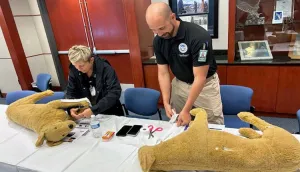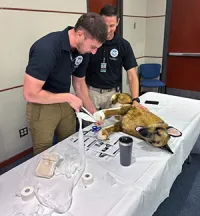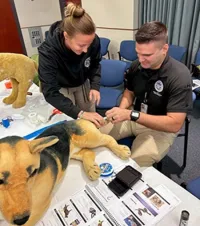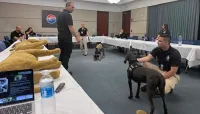 Canine handlers April Dwight and Kelsey King practice applying splints to a dog’s broken leg. (TSA TPA photo)
Canine handlers April Dwight and Kelsey King practice applying splints to a dog’s broken leg. (TSA TPA photo)
All too often we hear about medical emergencies involving passengers or even TSA employees at our nation’s airports. At Florida’s Tampa International Airport (TPA), TSA is putting a special emphasis on the potential of a crisis involving the team’s explosives detection canines.
TSA Tampa held a significant training event just for canine handlers and their dogs. TPA Canine Supervisor John Grice said they practiced critical canine emergency first-aid skills, which he described as “vital to the safety of our handlers and their canines.”
“The training included canine emergencies in conventional and tactical environments, so handlers will be prepared to respond wherever and whenever they need to,” said Grice. “I felt it was critical to have all canine handlers and support staff attend so they are trained on lifesaving skills in case an emergency happens and are equipped to save a canine’s life.”
TSA TPA brought in K9 Medic to lead the training. K9 Medic believes every working canine should have the equivalent medical, rescue and evacuation resources available to them as their human counterparts.
Instruction ranged from safe canine handling to treating the most common emergencies, such as heat stroke and stomach issues, to responding to tactical injuries including gunshot wounds.
“The goal was to teach and familiarize our canine handlers with the medical skills needed to prevent and treat injuries and illnesses in their working dogs,” Grice explained. “These are immediate lifesaving skills all explosives detection canine handlers need.”
Grice is convinced his canine team is now better equipped to handle doggy emergencies that could come their way.
“It’s critical training that I’m extremely happy we planned and received,” he emphasized. “Our working dogs are critical to the safety and security of the traveling public, so we need to ensure they are well taken care of to perform their mission.”
Grice encourages TSA teams at other airports across the nation to consider offering emergency training for their canine handlers. He said it’s widely available but requires support, scheduling and funding.
“I can’t thank the TPA command team enough for allowing us the time and funding to host this training,” said Grice. “They push us to be innovative and creative, understand the value in training of this nature and are hands down the most supportive command group I’ve seen in my 25-plus years of government service.”
Tampa TSA Federal Security Director Kirk Skinner believes offering this kind of training represents the quality of work his teams deliver every day.
“Whether it’s regional integrated training with our partners or supporting major events such as Super Bowls and political rallies, they are driven by a desire to achieve excellence in everything they do,” said Skinner. “Once there is a level of awareness in the organization, I think there will be a hard look at its overall utility and how best we can obtain this level of training. With the right resources, it could conceivably be taught in core training.”
Skinner said the entire TPA canine team is driven by the realization that what they do has real-world implications.
“Good enough is never good enough,” Skinner noted. “This is an example of an empowered organization in which individuals and teams are self-motivated. As a result, they continually achieve extraordinary things.”
By Don Wagner, TSA Strategic Communications & Public Affairs



